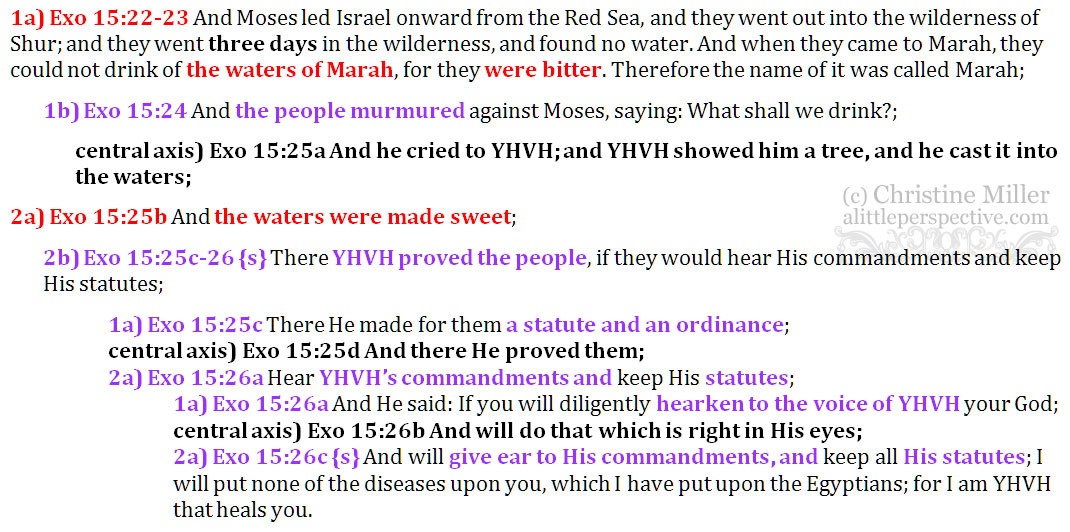
Read Exodus 15:22-26 at Bible Gateway.
Hebrew paragraph division
Exo 15:22-26 {s} Israel complained of no water + bitter water made sweet
Exo 15:22-26 Chiastic structure

Now this is what strikes me this morning. Notice that on the front side of the structure, we have bitter water, and murmuring, complaints. On the back side of the structure, after Moses cast the tree into the waters (a prophetic sign of Messiah in Torah), we have sweet waters, and healing of diseases, as the people give ear to His commandments (which are given to promote life, health, and happiness on this side of heaven). The teaching tool of comparison and contrast is being employed here, with an exchange of bitter for sweet, and murmuring for healing.
Hebrew roots
Bitter is Strong’s H4751 mar, an adjective meaning, “bitter;” from Strong’s H4843 מרר marar, a primitive root meaning, “to be bitter.” The ancient pictographs are mem + resh + resh.
mem מ, ם = the water, thus chaos, mighty, blood
resh ר = the head of man, thus head, first, top, beginning, man
resh ר = the head of man, thus head, first, top, beginning, man
The story being told is of water (mem) at its head (resh) which is the river’s beginning (resh), i.e., the headwaters of a river. According to the Ancient Hebrew Lexicon:
The headwaters of a river are only a trickle and have stagnant pools causing the water to be bitter.
The concrete noun is bitter, i.e., a thing which is of a bitter taste; but the abstract concept is weakness, because when someone endures a bitter sickness, weakness results. Other cognate words are lamb, as a weak animal; rebellion, as someone with a bitter attitude; irritation, as a disease can cause a bitter irritation; pit, as a place where waters stagnate, becoming bitter; bile, as the stomach fluid is bitter; venom, as the bitter poisonous fluid produced by a serpent; and myrrh, perhaps in its capacity as the positive spin, for myrrh is a sweet-smelling spice.
Going back to the comparison and contrast of bitter for sweet, and murmuring for complaining: notice how many cognate words have to do with weakness, sickness, and disease? I am also thinking of researchers that research venom for medicinal uses, and myrrh as an essential oil with healing properties. Then there are the bitter herbs of Passover, such as parsley, a known dark leafy green aiding in detoxifying the body.
Could the Torah be indicating that bitterness, either of body, or of soul, or even, a demonic spirit of bitterness, is a root cause of disease? I don’t know for sure, but this question is sure worth investigating further.
















Leave a Reply